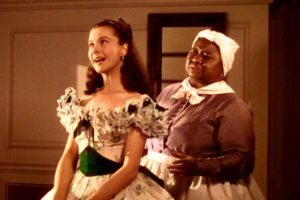 More than 20 years ago, before I became a regular columnist for this newspaper, I wrote a movie review of “Gone With the Wind.” I’d just seen it on the big screen, with enhanced sound and color, at Nashville’s 100 Oaks theatre. I came away with vastly different feelings than I’d had as a teenager, when the book and movie left me prostrate with grief.
More than 20 years ago, before I became a regular columnist for this newspaper, I wrote a movie review of “Gone With the Wind.” I’d just seen it on the big screen, with enhanced sound and color, at Nashville’s 100 Oaks theatre. I came away with vastly different feelings than I’d had as a teenager, when the book and movie left me prostrate with grief.
I still considered Scarlett O’Hara one of the greatest fictional characters of all times. That opinion hasn’t changed. How can you not admire a woman who can deliver a baby and on the same day lead that baby and his mama to safety through the burning streets of Atlanta with nothing but a broken-down wagon pulled by a half-dead horse and get home to find her mother dead and her father crazy and her plantation in ruins and then just push her hair out of her eyes and eat a rotten carrot and set about putting everything back together?
Even when I was 40-something,the romantic triangle in GWTW moved me to tears, though I was mature enough to think Scarlett something of a ninny (to use her own terminology) for pursuing Ashley Wilkes, the dreamer who also happened to be married to someone else, when dashing Rhett Butler was hers for the taking. How could any woman with a lick of sense lock her bedroom door to Clark Gable and sit mooning over a photograph of Leslie Howard?
But in an enormous about-face from my love for “Gone With the Wind” as a teenager, when I allowed myself to believe that most slaves (or “servants,” as the O’Hara family called them) were treated humanely, by the time I watched GWTW again in the 1990s, I knew better.
I’d read “Uncle Tom’s Cabin.” I’d read “The Confessions of Nat Turner” and “Beloved,” both of which—like “Gone With the Wind”—won a Pulitzer Prize for fiction. I’d taken the lessons of “Huckleberry Finn” and “To Kill a Mockingbird” to heart. I knew that the notion of loyal, contented slaves was just a myth.
These days, I’m intrigued as some folks get all riled up at the news that the HBO-Max streaming service has temporarily pulled “Gone With the Wind” from its film library following heightened racial tensions over the murder of George Floyd. When the film returns to HBO, it will be with the addition of an introduction by Jacqueline Stewart, professor of Cinema and Media Studies at the University of Chicago.
Stewart contends that GWTW continues to have a profound impact on the way audiences visualize the ante-bellum and Civil War south and the Reconstruction era. It romanticizes slavery as a benign and benevolent institution that was devoid of the physical abuse, grueling labor expectations and separation of families that were, in reality, common and widespread. HBO released this statement: “The film’s racist depictions were wrong then and wrong today. To keep this title up without a denouncement of those depictions would be irresponsible.”
I say hooray for HBO. And I agree with Jacqueline Stewart’s opinion that “Gone With the Wind”—which won eight Academy Awards and is the top-grossing film of all time, adjusted for inflation–should remain available for viewing, analysis and discussion. Fans who aren’t into that kind of thing can still stream, rent or purchase the movie, without commentary, from various sources. The novel is readily available as an audiobook, an e-book, or a “real” book.
Those who’ve taken to social media with cries of censorship and book-burning are mistaken.
Here’s hoping they’re willing to watch and read GWTW with fresh eyes and with a mind open to the possibility that the Old South wasn’t really such an idyllic place after all.
(June 21, 2020)